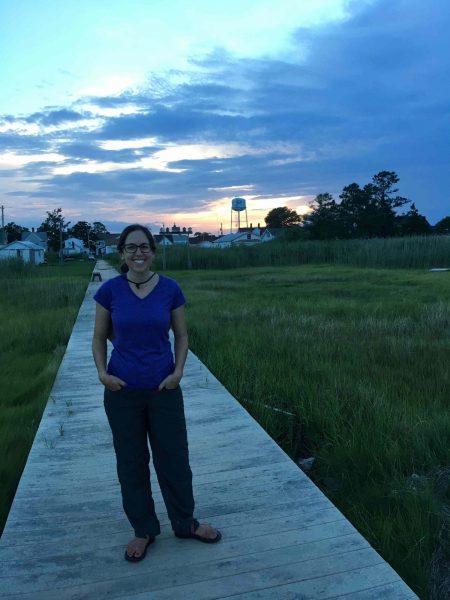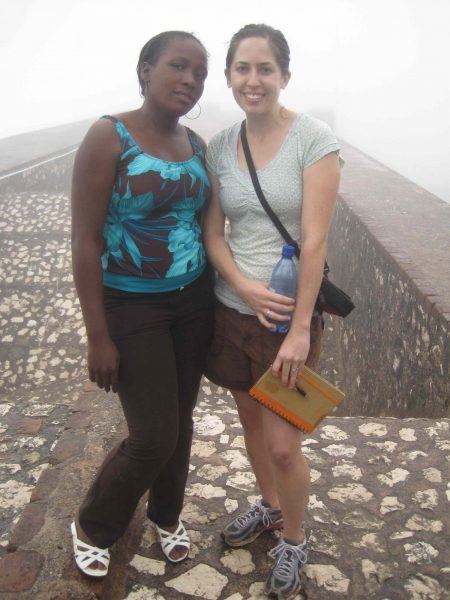Cultural Anthropologist Jonna Yarrington Joins CSU Anthropology and Geography
Josh Zaffos
January 31, 2024
In Fall 2023, Jonna Yarrington joined the Department of Anthropology and Geography as Assistant Professor of Cultural Anthropology and ready to dive into teaching and research surrounding family, kinship, and inheritance and related sociocultural, economic, and environmental matters.
Yarrington’s scholarship has focused on the connections and consequences among people and cultures, land inheritance and stewardship, development and growth, and conservation and environmental protection. Originally from Aurora, Colorado, Yarrington’s family later moved to Virginia. She received her bachelor’s degree at the College of William & Mary in Williamsburg where she was “drawn” into anthropology by the research methods, and then moved to the University of Arizona for her master’s degree and Ph.D. Along the way, she completed fieldwork in Williamsburg, Virginia, Haiti and the Caribbean, the desert Southwest, and mainland France, and Yarrington remains involved with research in most of these regions.
For her dissertation at Arizona, Yarrington undertook long-term research on remote Tangier Island, a small – and getting smaller – island in the Chesapeake Bay accessible only by boat or air. Tangier is shrinking and sinking due to climate change and other environmental factors and has provided a unique research site to understand generational land inheritance and the influences of climate disruptions and extreme weather and economic development and gentrification on individuals and families’ land ownership and social networks.
For me, anthropology won because, ultimately, I was drawn to the data. There was nothing more convincing to me than long-term research residing at a field site, learning local customs, language, and the world of symbols and meanings. That was the very beginning; I could never have dreamed up the adventures that this career would provide!
Yarrington plans to complete a book on her research on Tangier Island in 2024 while also settling in at CSU and sparking students’ interests in anthropological research methods and cultural and economic anthropology. We spoke with her about how she chose anthropology, her background as a “Caribbeanist” and lessons learned working in Haiti since the 2010 earthquake, and her passion for introducing students to anthropological research and field methods.

Welcome to CSU Anthropology and Geography! What are you most excited about at CSU and within the department?
Thank you! I’m so, so happy to be here! This spring, I am really looking forward to teaching field methods to undergraduates who are interested in cultural anthropology. Methods and research design are a serious passion of mine, so I’m really excited about getting that class going and talking shop.
In the longer term, I’m excited to be at a university that has such a commitment to studying environmental issues and human-environment interaction. Not just in our department, but throughout the university. I’m excited to see what sorts of collaborations and community-based projects will surface in the coming years.
Do you have any favorite experiences in Fort Collins and Colorado so far?
In August, shortly after I arrived, I had a chance to go to the Larimer County rodeo. It was an experience that did not disappoint! I was surprised, however, that my favorite part was meeting all the 4-H kids who had brought their livestock to be exhibited. There’s really no substitute for talking to a third grader who is passionate about raising pigs.
What led you into the field of cultural anthropology?
What got me started was a deep curiosity about collective human behavior. During my first semester of college, I took introductions to sociology, cultural anthropology, and microeconomics – all at the same time. Three disciplines in the social sciences that are wrestling with the same questions about the organization of social life. For me, anthropology won because, ultimately, I was drawn to the data. There was nothing more convincing to me than long-term research residing at a field site, learning local customs, language, and the world of symbols and meanings. That was the very beginning; I could never have dreamed up the adventures that this career would provide!
I’ve done research in European archives, traveled to French colonial South America, lived in rural Haiti, worked with indigenous American Indian groups in the desert southwest, studied the changing culture on a sinking island on the east coast of the US, and designed a Black community project in coastal Norfolk, Virginia. If I had chosen sociology or economics, I wouldn’t have had these life experiences and I definitely wouldn’t be the scholar I am today.
You study topics related to land ownership and tenancy, and how land is passed down, shared, or lost through succession, family, and other avenues? How did you start investigating these topics?
I spent considerable time in graduate school interested in both kinship and economic anthropology. Kinship is the ways in which people understand family bonds and the rights and obligations that come along with being “kin.” Economic anthropology is the study of economic relationships that make society cohere and structure the social order.

I chose my dissertation field site – the sinking island, Tangier Island, in the Chesapeake Bay – because it was the perfect place to study both economic and kin relations in the form of inheritance! Being on Tangier added another unavoidable and fascinating element: the fact that the island was sinking due, in part, to anthropogenic climate change. This allowed me to build a study of how inheritance practices – especially land and house inheritance – are being affected by physical processes of climate change. My work on Tangier is the subject of the book that I am finishing this year!
Have you done similar work in other settings?
After my work on Tangier, I took these same questions to a very different – but not that far away – place, specifically, urban Norfolk, Virginia, on the south edge of the bay, where I worked with a Black community that has been historically dispossessed by gentrification processes. The Norfolk project was applied anthropology, meaning that I wanted to understand how inheritance was being disrupted – both by gentrification and by sea-level rise – to actually answer those questions and, at the same time, I wanted to produce a deliverable for the community. We did some research and worked together to draft state legislation advocating for a renters’ cooperative, a down payment assistance program, and a locally-led community land trust. [Yarrington wrote about her work in Norfolk in Society for Cultural Anthropology’s Fieldsights digital publication in January 2024.]
What have been some important takeaways from your work in terms of your own understanding of these matters?
The most important finding from both projects is the same: capital is looking to escape. What I mean by that is that there are some elements of society who are looking for ways to profit from the processes that are the outcomes of climate change. This seems like a really obvious insight. But the implications differ.
In Norfolk, I observed and learned that there is a group of out-of-town developers seeking to exploit changing market values driven by sea-level rise as well as by the housing affordability crisis. This means that dispossession of less powerful groups is more likely, which in turn means that intergenerational wealth among these groups will be less likely to accumulate over time—driving a cycle of systemic racism.
On Tangier, the crisis of capital trying to escape often looks like despair. Those who cannot or do not move off the island face dwindling or difficult livelihoods and increasing loneliness in the middle of the bay and many turn to drugs and alcohol, which is a self-destructive way that society extracts the remaining surplus out of the island. In both cases, somebody is going to be left “holding the bag” when badly needed houses and land go under the water. The people left holding the bag will be those who lacked power in the first place: the disempowered community in Norfolk, or the remaining residents and children of Tangier.

You have also done research projects in Haiti and French Guiana since your graduate studies. Can you share more about that work?
Yes! I was originally trained as a Caribbeanist since my undergraduate days as the last student of Richard and Sally Price [accomplished anthropologists who have led studies and ethnographies of Caribbean and other cultures since the 1960s]. My relationship with Haiti began as an undergrad when I went on a trip around the country accompanying an ex-pat who was trying to set up a nonprofit organization. At the end of that trip, I survived the magnitude-7 earthquake in Port-au-Prince in 2010, which was certainly a once-in-a-lifetime experience. Since then, I have returned numerous times, including for extended periods – six months and longer at times – to work on research projects, generally in the rural north of the country.
I also did some research in French Guiana, related to my Master’s work on the French colonial sugar industry and Haitian migration. French Guiana is the last European colony in South America—and one of the farthest, most remote edges of the République! I found that Haitians were pouring across the porous river border with Suriname with the goal of reaching the metropole as a means of social and economic mobility. I’m working on an article summarizing this issue and discussing the implications for 21st-century colonialism. French Guiana is an incredibly interesting place; I hope I can go back someday!
How have these experiences and studies helped you grow as a person, a scholar, and an anthropologist?
To me, anthropology is about curiosity and the adventure of scientific discovery. I started with the spark of curiosity and the desire to explore the world. To become a scholar, I honed that excitement and sought in-depth training in research design and methods so that I could build projects that would not only satisfy my curiosity but would also produce generalizable knowledge about Homo sapiens. My past experiences producing this knowledge are deeply fulfilling because I have been privileged to have amazing, life-changing adventures. But I’ve also learned that new knowledge makes new questions. So – the most wonderful part – is that the curiosity never ends.
On a personal level, I’ve learned to prioritize the lives of my informants. Whether or not they desire a “deliverable” outcome from my research and no matter their social status or identity, I continually find ways to empathize with them and, in that process, strive to represent their lives, their sorrows, and their joys in ways that do justice to their experiences.
In addition to your book on Tangier Island, what research projects do you hope to continue and launch at CSU?
In the long term, I’m planning to start local applied projects in Colorado. Two unrelated issues – or are they? – that speak to me, as an environmental anthropologist, are Colorado’s history of mining and the uses of pesticides in agriculture. Both are clearly related to land use and land markets, which are both being affected by environmental change, of course, and which I hope to explore someday.
Are there courses you’re planning to develop, or that you’re looking forward to teach?
I’m looking forward to teaching Methods in Cultural Anthropology (ANTH 441) this semester because I’m a nut about social science research design and methodology. I also really want to develop an undergraduate, interdisciplinary Climate Justice class, which would explore the question of justice in terms of both environmental and intergenerational threats and harms. At the graduate level, I am really, really excited to offer a proposal-writing workshop at some point, as well as a methodological course on Discourse Analysis.